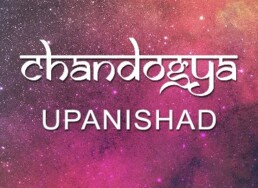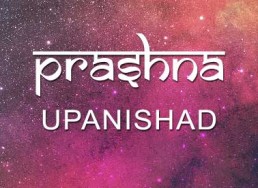Prashnopanishad-All-Verses
Prashnopanishad Introduction
Prashnopanishad is a key philosophical text within the Indian spiritual tradition, part of the larger body of literature known as the Upanishads. It belongs to the Atharva Veda and consists of six questions posed by a group of seekers to the sage Pippalada. These inquiries delve into profound topics such as the nature of ultimate reality (Brahman), the self (Atman), the relationship between the two, and the significance of meditation and knowledge.
The Prashna Upanishad contains three Prashnams (parts), each with two sections. The first Prashnam defines the science of “Higher Knowledge” and “Lower Knowledge”, and then asserts that acts of oblations and pious gifts are foolish, and do nothing to reduce unhappiness in current life or next, rather it is knowledge that frees. The second Prashnam describes the nature of the Brahman, the Self, the relation between the empirical world and the Brahman, and the path to know Brahman. The third Prashnam expands the ideas in the second Prashnam and then asserts that the state of knowing Brahman is one of freedom, fearlessness, complete liberation, self-sufficiency and bliss.
Prashnopanishad Links on our site
Prashnopanishad Home Page
Prashnopanishad Verse by Verse
Invocation
ॐ भद्रं कर्णेभिः शृणुयाम देवा
भद्रं पश्येमाक्षभिर्यजत्राः ।
स्थिरैरङ्गैस्तुष्तुवाꣳसस्तनूभिर्व्यशेम देवहितं यदायुः ॥
स्वस्ति न इन्द्रो वृद्धश्रवाः
स्वस्ति नः पूषा विश्ववेदाः ।
स्वस्ति नस्तार्क्ष्यो अरिष्टनेमिः
स्वस्ति नो बृहस्पतिर्दधातु ॥
ॐ शान्तिः शान्तिः शान्तिः ॥
bhadraṃ paśyemākṣabhiryajatrāḥ .
sthirairaṅgaistuṣtuvāgͫsastanūbhirvyaśema devahitaṃ yadāyuḥ ..
svasti na indro vṛddhaśravāḥ
svasti naḥ pūṣā viśvavedāḥ .
svasti nastārkṣyo ariṣṭanemiḥ
svasti no bṛhaspatirdadhātu ..
oṃ śāntiḥ śāntiḥ śāntiḥ ..
Om. May we, O gods, hear with our ears what is auspicious! May we, O worshipful gods, see with our eyes what is good! May we, strong in limbs and body, sing your praise and enjoy the life allotted to us by Prajapati! Om. Peace! Peace! Peace!
ॐ सुकेशा च भारद्वाजः शैब्यश्च सत्यकामः सौर्यायणी च गार्ग्यः
कौसल्यश्चाश्वलायनो भार्गवो वैदर्भिः कबन्धी कात्यायनस्ते हैते
ब्रह्मपरा ब्रह्मनिष्ठाः परं ब्रह्मान्वेषमाणा एष ह वै तत्सर्वं
वक्ष्यतीति ते ह समित्पाणयो भगवन्तं पिप्पलादमुपसन्नाः ॥ १.१॥
kausalyaścāśvalāyano bhārgavo vaidarbhiḥ kabandhī kātyāyanaste haite
brahmaparā brahmaniṣṭhāḥ paraṃ brahmānveṣamāṇā eṣa ha vai tatsarvaṃ
vakṣyatīti te ha samitpāṇayo bhagavantaṃ pippalādamupasannāḥ .. 1.1..
1 Om. Sukesa, the Son of Bharadvajaand Satyakama, the son of Sibiand Sauryayani, belonging to the family of Gargaand Kausalya, the son of Asvalaand Vaidarbhi, belonging to the family of Bhriguand Kahandhi, the Son of Katya all these, devoted to Brahman and firm in Brahman and seeking the Supreme Brahman, approached, fuel in hand, the venerable Pippalada with the thought that he would tell them everything about Brahman.
Translation by Max Mueller
1. Sukesas Bhâradvâga, and Saivya Satyakâma, and Sauryâyanin Gârgya, and Kausalya Âsvalâyana, and Bhârgava Vaidarbhi, and Kabandhin Kâtyâyana, these were devoted to Brahman, firm in Brahman, seeking for the Highest Brahman. They thought that the venerable Pippalâda could tell them all that, and they therefore took fuel in their hands (like pupils), and approached him.
संवत्सरं संवत्स्यथ यथाकामं प्रश्नान् पृच्छत यदि
विज्ञास्यामः सर्वं ह वो वक्ष्याम इति ॥ १.२॥
saṃvatsaraṃ saṃvatsyatha yathākāmaṃ praśnān pṛcchata yadi
vijñāsyāmaḥ sarvaṃ ha vo vakṣyāma iti .. 1.2..
2 The rishi said to them: Stay with me a year more, practising austerities, chastity and faith. Then you may ask questions according to your desire. If we know we shall tell you all.
Translation by Max Mueller
2. That Rishi said to them: Stay here a year longer, with penance, abstinence, and faith; then you may ask questions according to your pleasure, and if we know them, we shall tell you all.
भगवन् कुते ह वा इमाः प्रजाः प्रजायन्त इति ॥ १.३॥
bhagavan kute ha vā imāḥ prajāḥ prajāyanta iti .. 1.3..
3 Then Kabandhi, the son of Katya, came to him and asked: Sir, whence are these creatures born?
Translation by Max Mueller
3. Then Kabandhin Kâtyâyana approached him and asked: Sir, from whence may these creatures be born?
स तपस्तप्त्वा स मिथुनमुत्पादयते । रयिं च प्राणं
चेत्येतौ मे बहुधा प्रजाः करिष्यत इति ॥ १.४॥
sa tapastaptvā sa mithunamutpādayate . rayiṃ ca prāṇaṃ
cetyetau me bahudhā prajāḥ kariṣyata iti .. 1.4..
4 To him the teacher said: Prajapati, the Creator, was desirous of progeny. He performed austerities and having performed austerities, created the pair, the moon (rayi) and the sun (prana). He said to Himself: “These two should produce creatures for Me in manifold ways.”
Translation by Max Mueller
4. He replied: Prajapati (the lord of creatures) was desirous of creatures (pragâh). He performed penance, and having performed penance, he produces a pair, matter (rayi) and spirit (prâna), thinking that they together should produce creatures for him in many ways.
सर्वं यन्मूर्तं चामूर्तं च तस्मान्मूर्तिरेव रयिः ॥ १.५॥
sarvaṃ yanmūrtaṃ cāmūrtaṃ ca tasmānmūrtireva rayiḥ .. 1.5..
5 The sun is, indeed, prana, life; the moon is rayi, food. Food is, indeed, all this what has form and what is formless. Therefore everything having form is, indeed, food.
Translation by Max Mueller
5. The sun is spirit, matter is the moon. All this, what has body and what has no body, is matter, and therefore body indeed is matter.
रश्मिषु सन्निधत्ते । यद्दक्षिणां यत् प्रतीचीं यदुदीचीं यदधो
यदूर्ध्वं यदन्तरा दिशो यत् सर्वं प्रकाशयति तेन सर्वान् प्राणान्
रश्मिषु सन्निधत्ते ॥ १.६॥
raśmiṣu sannidhatte . yaddakṣiṇāṃ yat pratīcīṃ yadudīcīṃ yadadho
yadūrdhvaṃ yadantarā diśo yat sarvaṃ prakāśayati tena sarvān prāṇān
raśmiṣu sannidhatte .. 1.6..
6 Now the sun, when it rises, enters the eastern quarter and thereby enfolds the living beings of the east in its rays. And when it illuminates the southern, the western, the northern, the lower, the upper and the intermediate quarters when it illuminates everything it thus enfolds all living beings in its rays.
Translation by Max Mueller
6. Now Âditya, the sun, when he rises, goes toward the East, and thus receives the Eastern spirits into his rays. And when he illuminates the South, the West, the North, the Zenith, the Nadir, the intermediate quarters, and everything, he thus receives all spirits into his rays.
तदेतदृचाऽभ्युक्तम् ॥ १.७॥
tadetadṛcā’bhyuktam .. 1.7..
7 That sun rises every day the sun, which is the soul of all creatures, the soul of all forms, which is life and fire. This has been described by the following rik: The wise know him who is in all forms, full of rays, all knowing, non dual, the support of all life, the eye of all beings, the giver of heat. There rises the sun, the thousand rayed, existing in a hundred forms, the life of all creatures.
Translation by Max Mueller
7. Thus he rises, as Vaisvânara, (belonging to all men,) assuming all forms, as spirit, as fire. This has been said in the following verse:
परायणं ज्योतिरेकं तपन्तम् ।
सहस्ररश्मिः शतधा वर्तमानः
प्राणः प्रजानामुदयत्येष सूर्यः ॥ १.८॥
parāyaṇaṃ jyotirekaṃ tapantam .
sahasraraśmiḥ śatadhā vartamānaḥ
prāṇaḥ prajānāmudayatyeṣa sūryaḥ .. 1.8..
8 That sun rises every day the sun, which is the soul of all creatures, the soul of all forms, which is life and fire. This has been described by the following rik: The wise know him who is in all forms, full of rays, all knowing, non dual, the support of all life, the eye of all beings, the giver of heat. There rises the sun, the thousand rayed, existing in a hundred forms, the life of all creatures.
Translation by Max Mueller
8. (They knew) him who assumes all forms, the golden, who knows all things, who ascends highest, alone in his splendour, and warms us; the thousand-rayed, who abides in a hundred places, the spirit of all creatures, the Sun, rises.
तद्ये ह वै तदिष्टापूर्ते कृतमित्युपासते ते चान्द्रमसमेव
लोकमभिजयन्ते । त एव पुनरावर्तन्ते तस्मादेत ऋषयः
प्रजाकामा दक्षिणं प्रतिपद्यन्ते । एष ह वै रयिर्यः
पितृयाणः ॥ १.९॥
tadye ha vai tadiṣṭāpūrte kṛtamityupāsate te cāndramasameva
lokamabhijayante . ta eva punarāvartante tasmādeta ṛṣayaḥ
prajākāmā dakṣiṇaṃ pratipadyante . eṣa ha vai rayiryaḥ
pitṛyāṇaḥ .. 1.9..
9 The year, verily, is Prajapati and there arc two paths thereof: the Southern and the Northern. Those who perform sacrifices and engage in pious actions, as duties to be done, win only the World of the Moon; verily they return hither again. Therefore the rishis who desire off spring travel by the Southern Path. This Path of the Fathers is rayi, food.
Translation by Max Mueller
9. The year indeed is Prajapati, and there are two paths thereof, the Southern and the Northern. Now those who here believe in sacrifices and pious gifts as work done, gain the moon only as their (future) world, and return again. Therefore the Rishis who desire offspring, go to the South, and that path of the Fathers is matter (rayi).
विद्ययाऽऽत्मानमन्विष्यादित्यमभिजयन्ते । एतद्वै
प्राणानामायतनमेतदमृतमभयमेतत् परायणमेतस्मान्न पुनरावर्तन्त
इत्येष निरोधस्तदेष श्लोकः ॥ १.१०॥
vidyayā”tmānamanviṣyādityamabhijayante . etadvai
prāṇānāmāyatanametadamṛtamabhayametat parāyaṇametasmānna punarāvartanta
ityeṣa nirodhastadeṣa ślokaḥ .. 1.10..
10 But those who seek the Self through austerity, chastity, faith and knowledge travel by the Northern Path and win the Sun. The Sun, verily, is the support of all lives. He is immortal and fearless; He is the final goal. Thence they do not return. This path is blocked for the ignorant. Concerning it there is the following verse:
Translation by Max Mueller
10. But those who have sought the Self by penance, abstinence, faith, and knowledge, gain by the Northern path Âditya, the sun. This is the home of the spirits, the immortal, free from danger, the highest. From thence they do not return, for it is the end. Thus says the Sloka 1:
दिव आहुः परे अर्धे पुरीषिणम् ।
अथेमे अन्य उ परे विचक्षणं
सप्तचक्रे षडर आहुरर्पितमिति ॥ १.११॥
diva āhuḥ pare ardhe purīṣiṇam .
atheme anya u pare vicakṣaṇaṃ
saptacakre ṣaḍara āhurarpitamiti .. 1.11..
11 Some call Him the father with five feet and with twelve forms, the giver of rain and the dweller in the region above the sky. Others, again, say that the world is fixed in the omniscient Sun, endowed with seven wheels and six spokes.
Translation by Max Mueller
11. Some call him the father with five feet (the five seasons), and with twelve shapes (the twelve months), the giver of rain in the highest half of heaven; others again say that the sage is placed in the lower half, in the chariot with seven wheels and six spokes.
ऋषयः शुक्ल इष्टं कुर्वन्तीतर इतरस्मिन् ॥ १.१२॥
ṛṣayaḥ śukla iṣṭaṃ kurvantītara itarasmin .. 1.12..
12 The month, verily, is Prajapati. Its dark half, verily, is food, rayi; its bright half, the eater, prana. Therefore some rishis perform sacrifice in the bright half, some in the other half.
Translation by Max Mueller
12. The month is Prajapati; its dark half is matter, its bright half spirit. Therefore some Rishis perform sacrifice in the bright half, others in the other half.
प्रस्कन्दन्ति ये दिवा रत्या संयुज्यन्ते ब्रह्मचर्यमेव तद्यद्रात्रौ
रत्या संयुज्यन्ते ॥ १.१३॥
praskandanti ye divā ratyā saṃyujyante brahmacaryameva tadyadrātrau
ratyā saṃyujyante .. 1.13..
13 Day and night, verily, are Prajapati. Of these, day is the eater, prana and night, the food, rayi. Those who join in sexual enjoyment by day verily dissipate life; but to join in sexual enjoyment by night is, verily, chastity.
Translation by Max Mueller
13. Day and Night are Prajapati; its day is spirit, its night matter. Those who unite in love by day waste their spirit, but to unite in love by night is right.
प्रजायन्त इति ॥ १.१४॥
prajāyanta iti .. 1.14..
14 Food, verily, is Prajapati. From that comes semen; from semen are all these creatures born.
Translation by Max Mueller
14. Food is Prajapati. Hence proceeds seed, and from it these creatures are born.
तेषामेवैष ब्रह्मलोको येषां तपो ब्रह्मचर्यं येषु सत्यं
प्रतिष्ठितम् ॥ १.१५॥
teṣāmevaiṣa brahmaloko yeṣāṃ tapo brahmacaryaṃ yeṣu satyaṃ
pratiṣṭhitam .. 1.15..
15 Those, therefore, who practise this rule of Prajapati beget a pair. But Brahmaloka belongs to those who observe austerity and chastity and in whom truth is firmly established.
Translation by Max Mueller
15. Those therefore who observe this rule of Prajapati (as laid down in § 13), produce a pair, and to them belongs this Brahma-world here. But those in whom dwell penance, abstinence, and truth,
माया चेति ॥ १.१६॥
इति प्रश्नोपनिषदि प्रथमः प्रश्नः ॥
māyā ceti .. 1.16..
iti praśnopaniṣadi prathamaḥ praśnaḥ ..
16 The stainless World of Brahma belongs to those in whom there is no crookedness, no falsehood, no deception.
Translation by Max Mueller
16. To them belongs that pure Brahma-world, to them, namely, in whom there is nothing crooked, nothing false, and no guile.
अथ हैनं भार्गवो वैदर्भिः पप्रच्छ । भगवन् कत्येव
देवाः प्रजां विधारयन्ते कतर एतत् प्रकाशयन्ते कः
पुनरेषां वरिष्ठ इति ॥ २.१॥
devāḥ prajāṃ vidhārayante katara etat prakāśayante kaḥ
punareṣāṃ variṣṭha iti .. 2.1..
1 Then Vaidarbhi, belonging to the family of Bhrigu, asked him: Sir, how many gods support the body of the created being? How many of these manifest their power through it? And which one, furthermore, is paramount?
Translation by Max Mueller
1. Then Bhârgava Vaidarbhi asked him: Sir, How many gods keep what has thus been created, how many manifest this, and who is the best of them?
पृथिवी वाङ्मनश्चक्षुः श्रोत्रं च । ते प्रकाश्याभिवदन्ति
वयमेतद्बाणमवष्टभ्य विधारयामः ॥ २.२॥
pṛthivī vāṅmanaścakṣuḥ śrotraṃ ca . te prakāśyābhivadanti
vayametadbāṇamavaṣṭabhya vidhārayāmaḥ .. 2.2..
2 To the disciple he said: Space, akasa, verily is that god the wind, fire, water, earth, speech, mind, eye and ear, as well. These, having manifested their glory, said boastfully: “We support this body and uphold it.”
Translation by Max Mueller
2. He replied: The ether is that god, the wind, fire, water, earth, speech, mind, eye, and ear. These, when they have manifested (their power), contend and say: We (each of us) support this body and keep it.
पञ्चधाऽऽत्मानं प्रविभज्यैतद्बाणमवष्टभ्य विधारयामीति
तेऽश्रद्दधाना बभूवुः ॥ २.३॥
pañcadhā”tmānaṃ pravibhajyaitadbāṇamavaṣṭabhya vidhārayāmīti
te’śraddadhānā babhūvuḥ .. 2.3..
3 To them prana, the chiefmost said: “Do not fall into delusion. I alone, dividing myself into five parts, support this body and uphold it.” But they were incredulous.
Translation by Max Mueller
3. Then Prâna (breath, spirit, life), as the best, said to them: Be not deceived, I alone, dividing myself fivefold, support this body and keep it.
एवोत्क्रामन्ते तस्मिंश्च प्रतिष्ठमाने सर्व एव प्रतिष्ठन्ते । तद्यथा
मक्षिका मधुकरराजानमुत्क्रामन्तं सर्व एवोत्क्रमन्ते तस्मिंष्च
प्रतिष्ठमाने सर्व एव प्रातिष्टन्त एवं वाङ्मनष्चक्षुः श्रोत्रं
च ते प्रीताः प्राणं स्तुन्वन्ति ॥ २.४॥
evotkrāmante tasmiṃśca pratiṣṭhamāne sarva eva pratiṣṭhante . tadyathā
makṣikā madhukararājānamutkrāmantaṃ sarva evotkramante tasmiṃṣca
pratiṣṭhamāne sarva eva prātiṣṭanta evaṃ vāṅmanaṣcakṣuḥ śrotraṃ
ca te prītāḥ prāṇaṃ stunvanti .. 2.4..
4 Prana, out of pride, rose upward, as it were, from the body. Now, when it rose upward all the others rose upward also and when it settled down they all settled down with it. As bees go out when their queen goes out and return when she returns, even so did speech, mind, eye and ear. They, being satisfied, praised prana.
Translation by Max Mueller
4. They were incredulous; so he, from pride, did as if he were going out from above. Thereupon, as he went out, all the others went out, and as he returned, all the others returned. As bees go out when their queen goes out, and return when she returns, thus (did) speech, mind, eye, and ear; and, being satisfied, they praise Prâna, saying:
एष पर्जन्यो मघवानेष वायुः
एष पृथिवी रयिर्देवः
सदसच्चामृतं च यत् ॥ २.५॥
eṣa parjanyo maghavāneṣa vāyuḥ
eṣa pṛthivī rayirdevaḥ
sadasaccāmṛtaṃ ca yat .. 2.5..
5 It burns as fire, it is the sun, it is the rain; it is Indra, it is the wind, it is the earth, it is food. It is the luminous god. It is being and non being; it is immortality.
Translation by Max Mueller
5. He is Agni (fire), he shines as Sûrya (sun), he is Parganya (rain), the powerful (Indra), he is Vâyu, (wind), he is the earth, he is matter, he is God–he is what is and what is not, and what is immortal.
ऋचो यजूꣳषि सामानि यज्ञः क्षत्रं ब्रह्म च ॥ २.६॥
ṛco yajūgͫṣi sāmāni yajñaḥ kṣatraṃ brahma ca .. 2.6..
6 As spokes in the hub of a wheel, all are fixed in prana, including the Rig Veda, the Yajur Veda, the Sama Veda, the kshattriyas and the brahmins.
Translation by Max Mueller
6. As spokes in the nave of a wheel, everything is fixed in Prâna, the verses of the Rig-veda, Yagur-veda, Sâma-veda, the sacrifice, the Kshatriyas, and the Brâhmans.
तुभ्यं प्राण प्रजास्त्विमा बलिं हरन्ति
यः प्राणैः प्रतितिष्ठसि ॥ २.७॥
tubhyaṃ prāṇa prajāstvimā baliṃ haranti
yaḥ prāṇaiḥ pratitiṣṭhasi .. 2.7..
7 As Prajapati thou movest about in the womb; it is thou, indeed, who art born again. To thee, O Prana, creatures bring offerings, to thee who dwellest in the body with the organs.
Translation by Max Mueller
7. As Prajapati (lord of creatures) Prajapati movest about in the womb, thou indeed art born again. To thee, the Prâna, these creatures bring offerings, to thee who dwellest with the other prânas (the organs of sense).
ऋषीणां चरितं सत्यमथर्वाङ्गिरसामसि ॥ २.८॥
ṛṣīṇāṃ caritaṃ satyamatharvāṅgirasāmasi .. 2.8..
8 Thou art the chief bearer of oblations to the gods and the first offering to the departed fathers; thou art the true activities of the rishis, of the Atharvangiras.
Translation by Max Mueller
8. Thou art the best carrier for the Gods, thou art the first offering to the Fathers. Thou art the true work of the Rishis, of the Atharvâṅgiras.
त्वमन्तरिक्षे चरसि सूर्यस्त्वं ज्योतिषां पतिः ॥ २.९॥
tvamantarikṣe carasi sūryastvaṃ jyotiṣāṃ patiḥ .. 2.9..
9 Indra thou art, O Prana and Rudra, too, in prowess. Thou art the Protector. Thou movest in the sky; thou art the sun, the lord of lights.
Translation by Max Mueller
9. O Prâna, thou art Indra by thy light, thou art Rudra, as a protector; thou movest in the sky, thou art the sun, the lord of lights.
आनन्दरूपास्तिष्ठन्ति कामायान्नं भविष्यतीति ॥ २.१०॥
ānandarūpāstiṣṭhanti kāmāyānnaṃ bhaviṣyatīti .. 2.10..
10 When, O Prana, thou showerest down rain, these creatures of thine are delighted, thinking there will be as much food as they desire.
Translation by Max Mueller
10. When thou showerest down rain, then, O Prâna, these creatures of thine are delighted, hoping that there will be food, as much as they desire.
वयमाद्यस्य दातारः पिता त्वं मातरिश्व नः ॥ २.११॥
vayamādyasya dātāraḥ pitā tvaṃ mātariśva naḥ .. 2.11..
11 Thou art vratya, O Prana and the Ekarshi Fire that devours the butter. Thou art the Supreme Lord of all. We are the givers of the butter that thou consumest, O Matarisva! Thou art our father.
Translation by Max Mueller
11. Thou art a Vrâtya, O Prâna, the only Rishi, the consumer of everything, the good lord. We are the givers of what thou hast to consume, thou, O Mâtarisva, art our father.
या च मनसि सन्तता शिवां तां कुरु मोत्क्रमीः ॥ २.१२॥
yā ca manasi santatā śivāṃ tāṃ kuru motkramīḥ .. 2.12..
12 That form of thine which abides in speech, which abides in the ear, which abides in the eye and which pervades the mind, make propitious. Go not away!
Translation by Max Mueller
12. Make propitious that body of thine which dwells in speech, in the ear, in the eye, and which pervades the mind; do not go away!
मातेव पुत्रान् रक्षस्व श्रीश्च प्रज्ञां च विधेहि न इति ॥ २.१३॥
इति प्रश्नोपनिषदि द्वितीयः प्रश्नः ॥
māteva putrān rakṣasva śrīśca prajñāṃ ca vidhehi na iti .. 2.13..
iti praśnopaniṣadi dvitīyaḥ praśnaḥ ..
13 All that exists here is under the control of prana and also what exists in heaven. Protect us as a mother her sons; bestow upon us prosperity and wisdom.
Translation by Max Mueller
13. All this is in the power of Prâna, whatever exists in the three heavens. Protect us like a mother her sons, and give us happiness and wisdom.
अथ हैनं कौशल्यश्चाश्वलायनः पप्रच्छ । भगवन् कुत
एष प्राणो जायते कथमायात्यस्मिञ्शरीर आत्मानं वा
प्रविभज्य कथं प्रतिष्ठते केनोत्क्रमते कथं बाह्यमभिधत्ते
कथमध्यात्ममिति ॥ ३.१॥
eṣa prāṇo jāyate kathamāyātyasmiñśarīra ātmānaṃ vā
pravibhajya kathaṃ pratiṣṭhate kenotkramate kathaṃ bāhyamabhidhatte
kathamadhyātmamiti .. 3.1..
1 Then Kausalya, the son of Asvala, asked Pippalada: Sir, whence is this prana born? How does it come into this body? How does it abide in the body after it has divided itself? How does it depart? How does it support the external and how the internal?
Translation by Max Mueller
1. Then Kausalya Âsvalâyana asked: Sir, whence is that Prâna (spirit) born? How does it come into this body? And how does it abide, after it has divided itself? How does it go out? How does it support what is without, and how what is within?
तस्मात्तेऽहं ब्रवीमि ॥ ३.२॥
tasmātte’haṃ bravīmi .. 3.2..
2 To him the teacher replied: You are asking difficult questions; you must be exceedingly devoted to Brahman. Therefore I will answer you.
Translation by Max Mueller
2. He replied: You ask questions more difficult, but you are very fond of Brahman, therefore I shall tell it you.
छायैतस्मिन्नेतदाततं
मनोकृतेनायात्यस्मिञ्शरीरे ॥ ३.३॥
chāyaitasminnetadātataṃ
manokṛtenāyātyasmiñśarīre .. 3.3..
3 This prana is born of Atman. As a shadow is cast by a person, so this prana is, by Atman. Through the activity of the mind it comes into this body.
Translation by Max Mueller
3. This Prâna (spirit) is born of the Self. Like the shadow thrown on a man, this (the prâna) is spread out over it (the Brahman). By the work of the mind does it come into this body.
ग्रामानधितिष्ठस्वेत्येवमेवैष प्राण इतरान् प्राणान् पृथक्
पृथगेव सन्निधत्ते ॥ ३.४॥
grāmānadhitiṣṭhasvetyevamevaiṣa prāṇa itarān prāṇān pṛthak
pṛthageva sannidhatte .. 3.4..
4 As an emperor commands his officials, saying; “Rule these villages or those,” so this prana employs the other pranas, each in its separate place.
Translation by Max Mueller
4. As a king commands officials, saying to them: Rule these villages or those, so does that Prâna (spirit) dispose the other prânas, each for their separate work.
प्रातिष्ठते मध्ये तु समानः । एष ह्येतद्धुतमन्नं समं नयति
तस्मादेताः सप्तार्चिषो भवन्ति ॥ ३.५॥
prātiṣṭhate madhye tu samānaḥ . eṣa hyetaddhutamannaṃ samaṃ nayati
tasmādetāḥ saptārciṣo bhavanti .. 3.5..
5 Prana engages apana in the organs of excretion and generation; he himself moves through the mouth and nose and dwells in the eye and ear. In the middle is samana; it distributes equally what has been offered as food in the fire in the stomach. From this prana fire arise the seven flames.
Translation by Max Mueller
5. The Apâna (the down-breathing) in the organs of excretion and generation; the Prâna himself dwells in eye and ear, passing through mouth and nose. In the middle is the Samâna (the on-breathing); it carries what has been sacrificed as food equally (over the body), and the seven lights proceed from it.
शतमेकैकस्या द्वासप्ततिर्द्वासप्ततिः प्रतिशाखानाडीसहस्राणि
भवन्त्यासु व्यानश्चरति ॥ ३.६॥
śatamekaikasyā dvāsaptatirdvāsaptatiḥ pratiśākhānāḍīsahasrāṇi
bhavantyāsu vyānaścarati .. 3.6..
6 The atman dwells in the heart, where there are one hundred and one arteries (nadi); for each of these there are one hundred branches and for each of these branches, again, there are seventy two thousand subsidiary vessels. Vyana moves in these.
Translation by Max Mueller
6. The Self is in the heart. There are the 101 arteries, and in each of them there are a hundred (smaller veins), and for each of these branches there are 72,000. In these the Vyâna (the back-breathing) moves.
पापमुभाभ्यामेव मनुष्यलोकम् ॥ ३.७॥
pāpamubhābhyāmeva manuṣyalokam .. 3.7..
7 And then udana, ascending upward through one of them, conducts the departing soul to the virtuous world, for its virtuous deeds; to the sinful world, for its sinful deeds; and to the world of men, for both.
Translation by Max Mueller
7. Through one of them, the Udâna (the out-breathing) leads (us) upwards to the good world by good work, to the bad world by bad work, to the world of men by both.
प्राणमनुगृह्णानः । पृथिव्यां या देवता सैषा पुरुषस्य
अपानमवष्टभ्यान्तरा यदाकाशः स समानो वायुर्व्यानः ॥ ३.८॥
prāṇamanugṛhṇānaḥ . pṛthivyāṃ yā devatā saiṣā puruṣasya
apānamavaṣṭabhyāntarā yadākāśaḥ sa samāno vāyurvyānaḥ .. 3.8..
8 The sun, verily, is the external prana; for it rises, favouring the prana in the eye. The deity that exists in the earth controls the apana of man. The space, akasa, between heaven and earth is samana. The air is vyana.
Translation by Max Mueller
8. The sun rises as the external Prâna, for it assists the Prâna in the eye. The deity that exists in the earth, is there in support of mans Apâna (down-breathing). The ether between (sun and earth) is the Samâna (on-breathing), the air is Vyâna (back-breathing).
सम्पद्यमानैः ॥ ३.९॥
sampadyamānaiḥ .. 3.9..
9 Fire, verily, is udana; therefore he whose fire has been extinguished goes out for rebirth, with the senses absorbed in the mind.
Translation by Max Mueller
9. Light is the Udâna (out-breathing), and therefore he whose light has gone out comes to a new birth with his senses absorbed in the mind.
तथासङ्कल्पितं लोकं नयति ॥ ३.१०॥
tathāsaṅkalpitaṃ lokaṃ nayati .. 3.10..
10 Whatever one’s thinking, with that one enters into prana. Prana joined with fire, together with the soul, leads to whatever world has been fashioned by thought.
Translation by Max Mueller
10. Whatever his thought (at the time of death) with that he goes back to Prâna, and the Prâna, united with light, together with the self (the jîvâtmâ) leads on to the world, as deserved.
भवति तदेषः श्लोकः ॥ ३.११॥
bhavati tadeṣaḥ ślokaḥ .. 3.11..
11 The wise man who thus knows prana does not lose his offspring and becomes immortal. As to this there is the following verse:
Translation by Max Mueller
11. He who, thus knowing, knows Prâna, his offspring does not perish, and he becomes immortal. Thus says the Sloka:
अध्यात्मं चैव प्राणस्य विज्ञायामृतमश्नुते
विज्ञायामृतमश्नुत इति ॥ ३.१२॥
इति प्रश्नोपनिषदि तृतीयः प्रश्नः ॥
adhyātmaṃ caiva prāṇasya vijñāyāmṛtamaśnute
vijñāyāmṛtamaśnuta iti .. 3.12..
iti praśnopaniṣadi tṛtīyaḥ praśnaḥ ..
12 He who knows the origin of prana, its entry, its place, its fivefold distribution, its internal aspect and also its external, obtains immortality; yea, he obtains immortality.
Translation by Max Mueller
12. He who has known the origin, the entry, the place, the fivefold distribution, and the internal state of the Prâna, obtains immortality, yes, obtains immortality.
अथ हैनं सौर्यायणि गार्ग्यः पप्रच्छ । भगवन्नेतस्मिन् पुरुषे
कानि स्वपन्ति कान्यस्मिञ्जाग्रति कतर एष देवः स्वप्नान् पश्यति
कस्यैतत् सुखं भवति कस्मिन्नु सर्वे सम्प्रतिष्ठिता भवन्तीति ॥ ४.१॥
kāni svapanti kānyasmiñjāgrati katara eṣa devaḥ svapnān paśyati
kasyaitat sukhaṃ bhavati kasminnu sarve sampratiṣṭhitā bhavantīti .. 4.1..
1 Next Sauryayani, belonging to the family of Garga, asked: Sir, what are they that sleep in man and what are they that remain awake in him? Which deity is it that sees dreams? Whose is the happiness? In whom, again, are all these gathered together?
Translation by Max Mueller
1. Then Sauryâyanin Gârgya asked: Sir, What are they that sleep in this man, and what are they that are awake in him? What power (deva) is it that sees dreams? Whose is the happiness? On what do all these depend?
एतस्मिंस्तेजोमण्डल एकीभवन्ति ताः पुनः पुनरुदयतः प्रचरन्त्येवं
ह वै तत् सर्वं परे देवे मनस्येकीभवति तेन तर्ह्येष पुरुषो न
शृणोति न पश्यति न जिघ्रति न रसयते न स्पृशते नाभिवदते
नादत्ते नानन्दयते न विसृजते नेयायते स्वपितीत्याचक्षते ॥ ४.२॥
etasmiṃstejomaṇḍala ekībhavanti tāḥ punaḥ punarudayataḥ pracarantyevaṃ
ha vai tat sarvaṃ pare deve manasyekībhavati tena tarhyeṣa puruṣo na
śṛṇoti na paśyati na jighrati na rasayate na spṛśate nābhivadate
nādatte nānandayate na visṛjate neyāyate svapitītyācakṣate .. 4.2..
2 To him Pippalada replied: O Gargya, as the rays of the sun, when it sets, are gathered in that luminous orb and again go forth when it rises, even so, verily, all these the objects and the senses become one in the superior god, the mind. Therefore at that time a man hears not, sees not, smells not, tastes not, touches not, speaks not, grasps not, enjoys not, emits not and does not move about. He sleeps that is what people say.
Translation by Max Mueller
2. He replied: O Gârgya, As all the rays of the sun, when it sets, are gathered up in that disc of light, and as they, when the sun rises again and again, come forth, so is all this (all the senses) gathered up in the highest faculty (deva) 1, the mind. Therefore at that time that man does not hear, see, smell, taste, touch, he does not speak, he does not take, does not enjoy, does not evacuate, does not move about. He sleeps, that is what people say.
व्यानोऽन्वाहार्यपचनो यद्गार्हपत्यात् प्रणीयते प्रणयनादाहवनीयः
प्राणः ॥ ४.३॥
vyāno’nvāhāryapacano yadgārhapatyāt praṇīyate praṇayanādāhavanīyaḥ
prāṇaḥ .. 4.3..
3 The prana fires remain awake in this city. Apana is the Garhapatya Fire and vyana, the Anvaharyapachana Fire. And prana is the Ahavaniya Fire, so called from being taken since it is taken from the Garhapatya Fire.
Translation by Max Mueller
3. The fires of the prânas are, as it were, awake in that town (the body). The Apâna is the Gârhapatya fire, the Vyâna the Anvâhâryapakana fire; and because it is taken out of the Gârhapatya fire, which is fire for taking out, therefore the Prâna is the Âhavanîya fire. Now the Apâna is identified with the Gârhapatya fire, no reason being given except afterwards, when it is said that the Prâna is the Âhavanîya fire, being taken out of the Gârhapatya, here called pranayana, in the same manner as the prâna proceeds in sleep from the apâna. The Vyâna is identified with the Dakshinâgni, the Southern fire, because it issues from the heart through an aperture on the right.
वाव यजमानः । इष्टफलमेवोदानः । स एनं यजमानमहरहर्ब्रह्म
गमयति ॥ ४.४॥
vāva yajamānaḥ . iṣṭaphalamevodānaḥ . sa enaṃ yajamānamaharaharbrahma
gamayati .. 4.4..
4 Samana is so called because it distributes equally the two oblations, namely, the out breathing and the in breathing; it is the priest. The mind, verily, is the sacrificer. Udana is the fruit of the sacrifice, because it leads the sacrificer every day, in deep sleep, to Brahman.
Translation by Max Mueller
4. Because it carries equally these two oblations, the out-breathing and the in-breathing, the Samâna is he (the Hotri priest). The mind is the sacrificer, the Udâna is the reward of the sacrifice, and it leads the sacrificer every day (in deep sleep) to Brahman.
दृष्टमनुपश्यति श्रुतं श्रुतमेवार्थमनुशृणोति
देशदिगन्तरैश्च प्रत्यनुभूतं पुनः पुनः प्रत्यनुभवति दृष्टं
चादृष्टं च श्रुतं चाश्रुतं चानुभूतं चाननुभूतं च
सच्चासच्च सर्वं पश्यति सर्वः पश्यति ॥ ४.५॥
dṛṣṭamanupaśyati śrutaṃ śrutamevārthamanuśṛṇoti
deśadigantaraiśca pratyanubhūtaṃ punaḥ punaḥ pratyanubhavati dṛṣṭaṃ
cādṛṣṭaṃ ca śrutaṃ cāśrutaṃ cānubhūtaṃ cānanubhūtaṃ ca
saccāsacca sarvaṃ paśyati sarvaḥ paśyati .. 4.5..
5 There, in dreams, that god, the mind, experiences glory. Whatever has been seen he sees again; whatever has been heard he hears again; whatever has been experienced in different countries and quarters, he experiences again. Whatever has been seen or not seen, heard or not heard and whatever is real or not real he sees it all. He sees all, himself being all.
Translation by Max Mueller
5. There that god (the mind) enjoys in sleep greatness. What has been seen, he sees again; what has been heard, he hears again; what has been enjoyed in different countries and quarters, he enjoys again; what has been seen and not seen, heard and not heard, enjoyed and not enjoyed, he sees it all; he, being all, sees.
पश्यत्यथ यदैतस्मिञ्शरीर एतत्सुखं भवति ॥ ४.६॥
paśyatyatha yadaitasmiñśarīra etatsukhaṃ bhavati .. 4.6..
6 When the jiva is overcome by light he sees no dreams; at that time, in this body, arises this happiness.
Translation by Max Mueller
6. And when he is overpowered by light, then that god sees no dreams, and at that time that happiness arises in his body.
ह वै तत् सर्वं पर आत्मनि सम्प्रतिष्ठते ॥ ४.७॥
ha vai tat sarvaṃ para ātmani sampratiṣṭhate .. 4.7..
7 As a bird goes to a tree to roost, even so, O friend, all this rests in the Supreme Atman: Earth and its subtle counterpart, water and its subtle counterpart, fire and its subtle counterpart, air and its subtle counterpart, akasa and its subtle counterpart, the eye and what can be seen, the ear and what can be heard, the nose and what can be smelt, the taste and what can be tasted, the skin and what can be touched, the organ of speech and what can be spoken, the hands and what can be grasped, the organ of generation and what can be enjoyed, the organ of excretion and what can be excreted, the feet and what is their destination, the mind (manas) and what can be thought, the intellect (buddhi) and what can be comprehended, the ego (ahamkara) and the object of egoism, the memory (chitta) and its object, knowledge (tejah) and its object, prana and what is to be supported.
Translation by Max Mueller
7. And, O friend, as birds go to a tree to roost, thus all this rests in the Highest Âtman,–
वायुश्च वायुमात्रा चाकाशश्चाकाशमात्रा च चक्षुश्च द्रष्टव्यं
च श्रोत्रं च श्रोतव्यं च घ्राणं च घ्रातव्यं च रसश्च
रसयितव्यं च त्वक्च स्पर्शयितव्यं च वाक्च वक्तव्यं च हस्तौ
चादातव्यं चोपस्थश्चानन्दयितव्यं च पायुश्च विसर्जयितव्यं च
यादौ च गन्तव्यं च मनश्च मन्तव्यं च बुद्धिश्च बोद्धव्यं
चाहङ्कारश्चाहङ्कर्तव्यं च चित्तं च चेतयितव्यं च तेजश्च
विद्योतयितव्यं च प्राणश्च विधारयितव्यं च ॥ ४.८॥
vāyuśca vāyumātrā cākāśaścākāśamātrā ca cakṣuśca draṣṭavyaṃ
ca śrotraṃ ca śrotavyaṃ ca ghrāṇaṃ ca ghrātavyaṃ ca rasaśca
rasayitavyaṃ ca tvakca sparśayitavyaṃ ca vākca vaktavyaṃ ca hastau
cādātavyaṃ copasthaścānandayitavyaṃ ca pāyuśca visarjayitavyaṃ ca
yādau ca gantavyaṃ ca manaśca mantavyaṃ ca buddhiśca boddhavyaṃ
cāhaṅkāraścāhaṅkartavyaṃ ca cittaṃ ca cetayitavyaṃ ca tejaśca
vidyotayitavyaṃ ca prāṇaśca vidhārayitavyaṃ ca .. 4.8..
8 As a bird goes to a tree to roost, even so, O friend, all this rests in the Supreme Atman: Earth and its subtle counterpart, water and its subtle counterpart, fire and its subtle counterpart, air and its subtle counterpart, akasa and its subtle counterpart, the eye and what can be seen, the ear and what can be heard, the nose and what can be smelt, the taste and what can be tasted, the skin and what can be touched, the organ of speech and what can be spoken, the hands and what can be grasped, the organ of generation and what can be enjoyed, the organ of excretion and what can be excreted, the feet and what is their destination, the mind (manas) and what can be thought, the intellect (buddhi) and what can be comprehended, the ego (ahamkara) and the object of egoism, the memory (chitta) and its object, knowledge (tejah) and its object, prana and what is to be supported.
Translation by Max Mueller
8. The earth and its subtile elements, the water and its subtile elements, the light and its subtile elements, the air and its subtile elements, the ether and its subtile elements; the eye and what can be seen, the ear and what can be heard, the nose and what can be smelled, the taste and what can be tasted, the skin and what can be touched, the voice and what can be spoken, the hands and what can be grasped, the feet and what can be walked, the mind and what can be perceived, intellect (buddhi) and what can be conceived, personality and what can be personified, thought and what can be thought, light and what can be lighted up, the Prâna and what is to be supported by it.
विज्ञानात्मा पुरुषः । स परेऽक्षर आत्मनि सम्प्रतिष्ठते ॥ ४.९॥
vijñānātmā puruṣaḥ . sa pare’kṣara ātmani sampratiṣṭhate .. 4.9..
9 He, verily, it is who sees, feels, hears, smells, tastes, thinks and knows. He is the doer, the intelligent self, the purusha. He is established in the Highest, the imperishable Atman.
Translation by Max Mueller
9. For he it is who sees, hears, smells, tastes, perceives, conceives, acts, he whose essence is knowledge, the person, and he dwells in the highest, indestructible Self,–
शुभ्रमक्षरं वेदयते यस्तु सोम्य । स सर्वज्ञः सर्वो भवति ।
तदेष श्लोकः ॥ ४.१०॥
śubhramakṣaraṃ vedayate yastu somya . sa sarvajñaḥ sarvo bhavati .
tadeṣa ślokaḥ .. 4.10..
10 He who knows that imperishable Being, bright, without shadow, without body, without colour, verily attains the Supreme, the undecaying Purusha, O my good friend, he who knows Atman becomes all knowing, becomes all. About it there is the following verse:
Translation by Max Mueller
10. He who knows that indestructible being, obtains (what is) the highest and indestructible, he without a shadow, without a body, without colour, bright–,yes, O friend, he who knows it, becomes all-knowing, becomes all. On this there is this Sloka:
तदक्षरं वेदयते यस्तु सोम्य स सर्वज्ञः सर्वमेवाविवेशेति ॥ ४.११॥
इति प्रश्नोपनिषदि चतुर्थः प्रश्नः ॥
tadakṣaraṃ vedayate yastu somya sa sarvajñaḥ sarvamevāviveśeti .. 4.11..
iti praśnopaniṣadi caturthaḥ praśnaḥ ..
11 He, O friend, who knows that imperishable Being wherein rests the intelligent self, together with the gods, the pranas and the elements he becomes all knowing and enters into all.
Translation by Max Mueller
11. He, O friend, who knows that indestructible being wherein the true knower, the vital spirits (prânas), together with all the powers (deva), and the elements rest, he, being all-knowing, has penetrated all.
अथ हैनं शैब्यः सत्यकामः पप्रच्छ । स यो ह वै
तद्भगवन्मनुष्येषु प्रायणान्तमोङ्कारमभिध्यायीत । कतमं वाव
स तेन लोकं जयतीति । तस्मै स होवाच ॥ ५.१॥
tadbhagavanmanuṣyeṣu prāyaṇāntamoṅkāramabhidhyāyīta . katamaṃ vāva
sa tena lokaṃ jayatīti . tasmai sa hovāca .. 5.1..
1 Then Satyakama, the son of Sibi, asked Pippalada; Sir, if among men someone should here meditate on the syllable AUM until death, which world, verily, would he win thereby?
Translation by Max Mueller
1. Then Saivya Satyakâma asked him:–Sir, if some one among men should meditate here until death on the syllable Om, what would he obtain by it?
तस्माद्विद्वानेतेनैवायतनेनैकतरमन्वेति ॥ ५.२॥
tasmādvidvānetenaivāyatanenaikataramanveti .. 5.2..
2 He replied: O Satyakama, the syllable AUM is the Supreme Brahman and also the other Brahman. Therefore he who knows it attains, with its support, the one or the other.
Translation by Max Mueller
2. He replied: O Satyakâma, the syllable Om (AUM) is the highest and also the other Brahman; therefore he who knows it arrives by the same means at one of the two.
जगत्यामभिसम्पद्यते । तमृचो मनुष्यलोकमुपनयन्ते स तत्र
तपसा ब्रह्मचर्येण श्रद्धया सम्पन्नो महिमानमनुभवति ॥ ५.३॥
jagatyāmabhisampadyate . tamṛco manuṣyalokamupanayante sa tatra
tapasā brahmacaryeṇa śraddhayā sampanno mahimānamanubhavati .. 5.3..
3 If he meditates on one letter (matra), then, being enlightened by that alone, he quickly comes back to earth after death. The rik verses lead him to the world of men. By practising austerity, chastity and faith he enjoys greatness.
Translation by Max Mueller
3. If he meditate on one Mâtrâ (the A), then, being enlightened by that only, he arrives quickly at the earth. The Rik-verses lead him to the world of men, and being endowed there with penance, abstinence, and faith, he enjoys greatness.
यजुर्भिरुन्नीयते सोमलोकम् । स सोमलोके विभुतिमनुभूय
पुनरावर्तते ॥ ५.४॥
yajurbhirunnīyate somalokam . sa somaloke vibhutimanubhūya
punarāvartate .. 5.4..
4 If, again, he meditates on the second letter, he attains the mind and is led up by the yajur verses to the intermediate space, to the Plane of the Moon. Having enjoyed greatness in the Plane of the Moon, he returns hither again.
Translation by Max Mueller
4. If he meditate with two Mâtrâs (A + U) he arrives at the Manas, and is led up by the Yagus-verses to the sky, to the Soma-world. Having enjoyed greatness in the Soma-world, he returns again.
ध्यायीत स तेजसि सूर्ये सम्पन्नः । यथा पादोदरस्त्वचा विनिर्मुच्यत
एवं ह वै स पाप्मना विनिर्मुक्तः स सामभिरुन्नीयते ब्रह्मलोकं
स एतस्माज्जीवघनात् परात्परं पुरिशयं पुरुषमीक्षते । तदेतौ
श्लोकौ भवतः ॥ ५.५॥
dhyāyīta sa tejasi sūrye sampannaḥ . yathā pādodarastvacā vinirmucyata
evaṃ ha vai sa pāpmanā vinirmuktaḥ sa sāmabhirunnīyate brahmalokaṃ
sa etasmājjīvaghanāt parātparaṃ puriśayaṃ puruṣamīkṣate . tadetau
ślokau bhavataḥ .. 5.5..
5 Again, he who meditates on the Highest Person through this syllable AUM consisting of three letters, becomes united with the effulgent Sun. As a snake is freed from its skin, even so he is freed from sin.
Translation by Max Mueller
5. Again, he who meditates with this syllable AUM of three Mâtrâs, on the Highest Person, he comes to light and to the sun. And as a snake is freed from its skin, so is he freed from evil. He is led up by the Sâman-verses to the Brahma-world; and from him, full of life (Hiranyagarbha, the lord of the Satya-loka), he learns to see the all-pervading, the Highest Person. And there are these two Slokas:
अन्योन्यसक्ताः अनविप्रयुक्ताः ।
क्रियासु बाह्याभ्यन्तरमध्यमासु
सम्यक् प्रयुक्तासु न कम्पते ज्ञः ॥ ५.६॥
anyonyasaktāḥ anaviprayuktāḥ .
kriyāsu bāhyābhyantaramadhyamāsu
samyak prayuktāsu na kampate jñaḥ .. 5.6..
6 The three letters of AUM, if employed separately, are mortal; but when joined together in meditation on the total Reality and used properly on the activities of the external, internal and intermediate states, the knower trembles not.
Translation by Max Mueller
6. The three Mâtrâs (A + U + M), if employed separate, and only joined one to another, are mortal; but in acts, external, internal, or intermediate, if well performed, the sage trembles not.
सामभिर्यत् तत् कवयो वेदयन्ते ।
तमोङ्कारेणैवायतनेनान्वेति विद्वान्
यत्तच्छान्तमजरममृतमभयं परं चेति ॥ ५.७॥
इति प्रश्नोपनिषदि पञ्चमः प्रश्नः ॥
sāmabhiryat tat kavayo vedayante .
tamoṅkāreṇaivāyatanenānveti vidvān
yattacchāntamajaramamṛtamabhayaṃ paraṃ ceti .. 5.7..
iti praśnopaniṣadi pañcamaḥ praśnaḥ ..
7 The wise man, meditating on AUM, attains this world by means of the rik verses; the intermediate world by means of the yajur verses; and that which is known to the seers by means of the sama verses. And also through the syllable AUM he realises that which is tranquil, free from decay, death and fear and which is the Highest.
Translation by Max Mueller
7. Through the Rik-verses he arrives at this world, through the Yagus-verses at the sky, through the Sâman-verses at that which the poets teach,–he arrives at this by means of the Oṅkâra; the wise arrives at that which is at rest, free from decay, from death, from fear,–the Highest.
अथ हैनं सुकेशा भारद्वाजः पप्रच्छ । भगवन् हिरण्यनाभः
कौसल्यो राजपुत्रो मामुपेत्यैतं प्रश्नमपृच्छत । षोडशकलं
भारद्वाज पुरुषं वेत्थ । तमहं कुमारमब्रुवं नाहमिमं वेद ।
यद्यहमिममवेदिषं कथं ते नावक्ष्यमिति । समूलो वा एष
परिशुष्यति योऽनृतमभिवदति तस्मान्नार्हम्यनृतं वक्तुम् । स
तूष्णीं रथमारुह्य प्रवव्राज । तं त्वा पृच्छामि क्वासौ पुरुष
इति ॥ ६.१॥
kausalyo rājaputro māmupetyaitaṃ praśnamapṛcchata . ṣoḍaśakalaṃ
bhāradvāja puruṣaṃ vettha . tamahaṃ kumāramabruvaṃ nāhamimaṃ veda .
yadyahamimamavediṣaṃ kathaṃ te nāvakṣyamiti . samūlo vā eṣa
pariśuṣyati yo’nṛtamabhivadati tasmānnārhamyanṛtaṃ vaktum . sa
tūṣṇīṃ rathamāruhya pravavrāja . taṃ tvā pṛcchāmi kvāsau puruṣa
iti .. 6.1..
1 Then Sukesa, the son of Bharadvaja, said to Pippalada: Sir, Hiranyabha, the prince of Kosala, once came to me and asked this question: “O son of Bharadvaja, do you know the Person with sixteen parts?” I said to the prince: “I do not know Him; if I knew Him, why should I not tell you? Surely he who speaks what is not true withers away to the very root; therefore I should not speak untruth.” Then he silently mounted his chariot and went away. Now I ask you: Where does that Person dwell?
Translation by Max Mueller
1. Then Sukesas Bhâradvâga asked him, saying: ‘Sir, Hiranyanâbha, the prince of Kosalâ, came to me and asked this question: Do you know the person of sixteen parts, O Bhâradvâga? I said to the prince: I do not know him; if I knew him, how should I not tell you? Surely, he who speaks what is untrue withers away to the very root; therefore I will not say what is untrue. Then he mounted his chariot and went away silently. Now I ask you, where is that person?’
यस्मिन्नताः षोडशकलाः प्रभवन्तीति ॥ ६.२॥
yasminnatāḥ ṣoḍaśakalāḥ prabhavantīti .. 6.2..
2 Pippalada said to him: That Person He from whom these sixteen parts arise is verily here within the body.
Translation by Max Mueller
2. He replied: ‘Friend, that person is here within the body, he in whom these sixteen parts arise.
कस्मिन्वा प्रतिष्ठिते प्रतिष्ठास्यामीति ॥ ६.३॥
kasminvā pratiṣṭhite pratiṣṭhāsyāmīti .. 6.3..
3 The Purusha reflected: “What is it by whose departure I shall depart and by whose staying I shall stay?”
Translation by Max Mueller
3. He reflected: What is it by whose departure I shall depart, and by whose staying I shall stay?
मनः । अन्नमन्नाद्वीर्यं तपो मन्त्राः कर्म लोका लोकेषु च नाम च
॥ ६.४॥
manaḥ . annamannādvīryaṃ tapo mantrāḥ karma lokā lokeṣu ca nāma ca
.. 6.4..
4 He created prana; from prana faith, space, air, fire, water, earth, the organs, mind, food; from food virility, austerity, the Vedic hymns, sacrifice, the worlds; and in the worlds He created names.
Translation by Max Mueller
4. He sent forth (created) Prâna (spirit); from Prâna Sraddhâ (faith), ether, air, light, water, earth, sense, mind, food; from food came vigour, penance, hymns, sacrifice, the worlds, and in the worlds the name also.
गच्छन्ति भिद्येते तासां नामरूपे समुद्र इत्येवं प्रोच्यते । एवमेवास्य
परिद्रष्टुरिमाः षोडशकलाः पुरुषायणाः पुरुषं प्राप्यास्तं गच्छन्ति
भिद्येते चासां नामरूपे पुरुष इत्येवं प्रोच्यते स एषोऽकलोऽमृतो
भवति तदेष श्लोकः ॥ ६.५॥
gacchanti bhidyete tāsāṃ nāmarūpe samudra ityevaṃ procyate . evamevāsya
paridraṣṭurimāḥ ṣoḍaśakalāḥ puruṣāyaṇāḥ puruṣaṃ prāpyāstaṃ gacchanti
bhidyete cāsāṃ nāmarūpe puruṣa ityevaṃ procyate sa eṣo’kalo’mṛto
bhavati tadeṣa ślokaḥ .. 6.5..
5 As these flowing rivers, bound for the ocean, disappear into the ocean after having reached it, their names and forms being destroyed and are called simply the ocean even so, these sixteen parts of the seer, whose goal is the Purusha, disappear into the Purusha after having reached Him, their names and forms being destroyed and are called simply the Purusha. He becomes free of parts and immortal. On this there is the following verse:
Translation by Max Mueller
5. As these flowing rivers that go towards the ocean, when they have reached the ocean, sink into it, their name and form are broken, and people speak of the ocean only, exactly thus these sixteen parts of the spectator that go towards the person (purusha), when they have reached the person, sink into him, their name and form are broken, and people speak of the person only, and he becomes without parts and immortal. On this there is this verse:
तं वेद्यं पुरुषं वेद यथ मा वो मृत्युः परिव्यथा इति ॥ ६.६॥
taṃ vedyaṃ puruṣaṃ veda yatha mā vo mṛtyuḥ parivyathā iti .. 6.6..
6 Know Him, the Purusha, who alone is to he known and in whom the parts rest firm, like the spokes in the nave of a wheel, that death may not affect you.
Translation by Max Mueller
6. That person who is to be known, he in whom these parts rest, like spokes in the nave of a wheel, you know him, lest death should hurt you.’
परमस्तीति ॥ ६.७॥
paramastīti .. 6.7..
7 Pippalada said to them: Thus far, indeed, I know the Supreme Brahman; there is nothing higher than this.
Translation by Max Mueller
7. Then he (Pippalâda) said to them: ‘So far do I know this Highest Brahman, there is nothing higher than it.’
तारयसीति । नमः परमऋषिभ्यो नमः परमऋषिभ्यः ॥ ६.८॥
इति प्रश्नोपनिषदि षष्ठः प्रश्नः ॥
tārayasīti . namaḥ paramaṛṣibhyo namaḥ paramaṛṣibhyaḥ .. 6.8..
iti praśnopaniṣadi ṣaṣṭhaḥ praśnaḥ ..
8 And they, worshipping him, said: Thou, indeed, art our father thou who hast taken us across our ignorance to the other shore. Adoration to the supreme rishis! Adoration to the supreme rishis!
Translation by Max Mueller
8. And they praising him, said: ‘You, indeed, are our father, you who carry us from our ignorance to the other shore.’
भद्रं पश्येमाक्षभिर्यजत्राः ।
स्थिरैरङ्गैस्तुष्तुवाꣳसस्तनूभिर्व्यशेम देवहितं यदायुः ॥
स्वस्ति न इन्द्रो वृद्धश्रवाः
स्वस्ति नः पूषा विश्ववेदाः ।
स्वस्ति नस्तार्क्ष्यो अरिष्टनेमिः
स्वस्ति नो बृहस्पतिर्दधातु ॥
ॐ शान्तिः शान्तिः शान्तिः ॥
bhadraṃ paśyemākṣabhiryajatrāḥ .
sthirairaṅgaistuṣtuvāgͫsastanūbhirvyaśema devahitaṃ yadāyuḥ ..
svasti na indro vṛddhaśravāḥ
svasti naḥ pūṣā viśvavedāḥ .
svasti nastārkṣyo ariṣṭanemiḥ
svasti no bṛhaspatirdadhātu ..
oṃ śāntiḥ śāntiḥ śāntiḥ ..
Om. May we, O gods, hear with our ears what is auspicious! May we, O worshipful gods, see with our eyes what is good! May we, strong in limbs and body, sing your praise and enjoy the life allotted to us by Prajapati!
Om. Peace! Peace! Peace!

Description
Key Themes of the Prashnopanishad:
Inquiry and Knowledge: The text emphasizes the importance of asking deep questions to attain higher knowledge and understanding. The dialogue format highlights the pursuit of truth through inquiry.
Brahman and Atman: A central focus is the exploration of the relationship between Brahman (the universal spirit) and Atman (the individual soul), illustrating their interconnectedness and the realization that they are ultimately one.
Meditation and Practice: The Prashnopanishad discusses various forms of meditation and spiritual practices that lead to self-realization and enlightenment.
Cosmology and Creation: The text offers insights into the nature of the universe and creation, providing a philosophical framework for understanding existence.
The Prashna Upanishad is divided into sections, each addressing a specific question. The answers provided by sage Pippalada are profound and reflect the metaphysical and experiential aspects of Vedanta philosophy.
Other deity_Prashna Shlokams
Chandogya Upanishad
Chandogy Upanishad Introduction and Verses - In Sanskrit with Audio, English Transliteration, Word Meaning and commentary by reputed scholars. The Chandogya Upanishad is a major Hindu philosophical text incorporated in the Sama Veda, and dealing…
Chandogya Upanishad All Verses
Chandogya Upanishad This is the English translation of the Chandogya-upanishad, including a commentary based on Swami Lokeswarananda’s weekl
Ishavasya All Verses
Introduction to Isavasya Upanishad The Īśāvāsyopaniṣad—so called from its initial words—forms the concluding chapter of the Saṃhitā of the Suklayajurveda The name of
Ishavasya Upanishad
The Isha Upanishad is embedded as the final chapter of the Shukla Yajurveda and is one of the shortest Upanishads, with 18 verses. It is the very first Upanishad in the Muktika canon of 108 Upanishads.
Kaivalya Upanishad
Kaivalya Upanishad Verses - In Sanskrit with Audio, English Transliteration, Word Meaning and commentary by reputed scholars. The Kaivalya Upanishad is a short yet profound text in Vedantic literature, classified among the minor Upanishads, yet…
Kaivalya Upanishad All Verses
The Kaivalya Upanishad is a short yet profound text in Vedantic literature, classified among the minor Upanishads, yet carrying the essence of the highest spiritual teachings. It belongs to the Atharva Veda and is deeply revered in the Advaita…
Katha Upanishad
The Katha Upanishad is embedded in the last 8 sections of the Krishna Yajurveda. It has two chapters divided into three Vallis each. It is a Mukhya upanishad and listed as #3 in the Muktika canon of 108 Upanishads.
Kathopanishad All Verses
The Katha Upanishad is a collection of philosophical poems representing a conversation between the sage Naciketas and Yama (god of death). They discuss the nature of Atman, Brahman and Moksha (liberation). The book is made up of six sections…
Kena Upanishad
The Kena Upanishad is embedded inside the last section of the Talavakara Brahmanam of the Samaveda. It is a Mukhya upanishad and listed as #2 in the Muktika canon of 108 Upanishads.
Kenopanishad-All-Verses
The Kena Upanishad or Kenopanishad (Kenopaniṣat) (also known as the Talavakara Upanishad) elucidates the concept of nirguna (qualityless) Brah
Mandukya Karika
The Mandukya Karika represents the first systematic philosophical exposition of Advaita Vedanta, transforming the concise twelve-verse Mandukya Upanishad into a comprehensive 215-verse treatise on non-dual philosophy.
Mandukya Upanishad All Verses
Mandukya Upanishad - A detailed Summary The Mandukya Upanishad is the shortest yet one of the most profound Upanishads, consisting of just 12 verses. It explores the n
Mundaka Upanishad
The Mundaka Upanishad is embedded is embedded in the Atharva Veda. It is a Mukhya upanishad and listed as #5 in the Muktika canon of 108 Upanishads.
Prashna Upanishad
The Prashna Upanishad is embedded is embedded in the Atharva Veda. It is a Mukhya upanishad and listed as #5 in the Muktika canon of 108 Upanishads.
Taittiriya Upanishad
The Taittiriya Upanishad is one of the primary Upanishads, as part of the Yajur Veda. It says that the highest goal is to know the Brahman, for that is Truth. It is divided into three sections, 1) the Siksha Valli, 2) the Brahmananda Valli and 3)…
Prashnopanishad-All-Verses – deity_Prashna – Prashnopanishad – Full text with meaning, audio and translation from Sanskrit to English, Telugu, Kannada, Tamil and more









